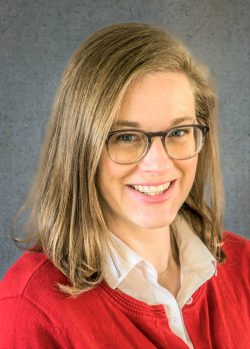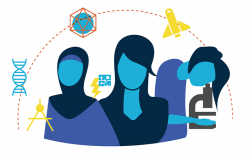Get to know Astrid Suchy-Dicey, epidemiologist and Notable Woman in STEM

As an epidemiologist, Astrid studies health and disease in whole populations. In many ways, it’s like being a physician but rather than focusing on one person at a time, she looks at large groups of people all at once. Astrid’s specialty centers around long-lasting diseases that affect the heart, kidneys, and brain, all diseases related to blood. Most recently, she’s focused on learning more about how the health of our brains changes in the long term.
Q: What were your education and career path? How did you get where you are now?
Believe it or not, I actually started my bachelor’s degree as an art history major, and later changed to general history with a biology minor. I’ve always been interested in biology, but at the time, I wasn’t sure what I wanted to do. I did know that I was interested in work that has a positive impact on the world. At first, I thought I might go into ecological conservation, like working in national parks, but after I graduated from college, I thought I might be interested in medicine. I decided to work in a medical lab, to see what it was like.
During this time, I was reading a book about a physician working in Haiti to fight malaria and tuberculosis. I found the book so inspiring, I decided to apply to graduate school to pursue a public health degree at the University of Washington. I didn’t want to focus solely on individuals but instead look at the health and well-being of whole populations. The reason I do what I do is because I’m interested in social justice. I want to help improve the world, even if it’s just a tiny bit. A mentor of mine told me our work is like adding drops of water to a bucket, any one person can only do so much. But together, if we all add a few drops, eventually we can fill the bucket of good work.

Q: Who were some of the most important influences that guided you to STEM?
For me, it would be both of my parents. They were both STEM professionals! They always supported me in my love of learning and growth. As a family of STEM specialists, we’ve always used science as a way of understanding the world around us. This idea has helped guide me in my life and in my work. My mom was a high achieving engineer in the eighties and that was a big deal. She was the only female engineer in her classes, and the only one with an advanced degree among her work colleagues. She has always blazed trails, and never let anyone tell her she couldn’t be in STEM. That definitely rubbed off on me. If my mom could do it, why couldn’t I? I look at my mom, her education and career path, and find it very inspirational.
Q: What do you like most about your job?
I really like how it can be different every day, I’m almost never doing the same thing. But this can be one of the most challenging things, too. You have to think on your feet. Everyday there’s a new challenge and a new puzzle to solve. I also really like learning new stuff that no one knows yet; asking new questions that no one’s asked before. And from there, I get to share my ideas with other scientists and I get learn about their ideas. Specifically, one of the most enjoyable parts about my job is when I get to dive into data. Data science is a complex field, and it’s rapidly growing and changing, which makes it really exciting to me. When I want to get hands-on with some problem solving, this is where I go.
Q: What unique qualities do you think girls and women bring to STEM?
I wouldn’t say that girls and women are more creative exactly, but I think they bring a unique type of creativity to STEM. Women tend to be very collaborative, and to work well in groups, which is very important in many sciences, especially public health. I think that women and men tend to think in different ways, but that’s not a bad thing! But having different types of people, who think differently, is a win-win for everyone. The more approaches you can have to a problem, the better off you will be at solving it.
Q: What would you like to say to young women thinking about beginning a career in STEM?
I think the struggles that girls or women have when they are pursuing STEM, or really anything in life, are things they have learned or been taught — things that they have been told about themselves. Those things are not true. There are certain challenges that girls have to face, but it’s not because of who you are, it’s because there are barriers that others might put in your way. Together, we can break those barriers down.
Q: What do you think us unique about Washington and the STEM career available here?
Washington is such a unique place. The amount of science and technology work done in this state is incredible. There are STEM jobs everywhere! From biology, genetics, data science, engineering, computer science, and so much more. The collaboration among academics, industry experts, and non-profit organizations in Washington is really awesome. There’s so much opportunity.
Q: What is one fact about you that most people don’t know?
While I was earning my college degree, specifically working on plant biology, I had the opportunity to live in France for a little bit. But the really neat thing is that I was working in historical French gardens that dated back centuries and as a part of that, I got to live in 12th and 16th century French chateau (castle) for a summer!